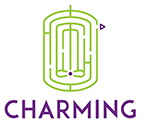Call for applicants:
2 out of 15 PhD positions in the EU Horizon 2020 Marie Skłodowska-Curie Project CHARMING
• 23-01-2019: Deadline for on-line application
• 02-2019 – 04-2019: Targeted starting date for ESR contracts
Key background info
Number of positions available
2 PhD Positions
Research Fields
Interdisciplinary research on the bridges between
1) Chemistry and Chemical Engineering,
2) Instructional psychology and pedagogy, and
3) Immersive technologies like games, augmented reality and virtual reality.
Potential candidates should be proficient in one of these three fields and have a clear interest in the two others.
Keywords
Chemistry and Chemical Engineering Education, Instructional Psychology, Pedagogical Technology, Gaming, VR/AR
Career Stage
Early Stage Researcher (ESR) or 0-4 yrs (Post Graduate)
Benefits and salary
The successful candidates will receive an attractive salary in accordance with the MSCA regulations for Early Stage Researchers. The exact (net) salary will be confirmed upon appointment and is dependent on local tax regulations and on the country correction factor (to allow for the difference in cost of living in different EU Member States). The salary includes a living allowance, a mobility allowance and a family allowance (if married). The guaranteed PhD funding is for 36 months (i.e. EC funding, additional funding is possible, depending on the local Supervisor, and in accordance with the regular PhD time in the country of origin). In addition to their individual scientific projects, all fellows will benefit from further continuing education, which includes internships and secondments, a variety of training modules as well as transferable skills courses and active participation in workshops and conferences.
On-line Recruitment Procedure (see Appendix 1)
All applications proceed through the on-line recruitment portal on the www.charming-etn.eu website. Candidates apply electronically for one to maximum three positions and indicate their preference. Candidates provide all requested information including a detailed CV (Europass format obligatory) and motivation letter. During the registration, applicants will need to prove that they are eligible (cf. ESR definition, mobility criteria, and English language proficiency). The deadline for the on-line registration is 23 January 2019.
Applicants need to fully respect three eligibility criteria (to demonstrated in the Europass cv):
Early-stage researchers (ESR) are those who are, at the time of recruitment by the host, in the first four years (full-time equivalent) of their research careers. This is measured from the date when they obtained the degree which formally entitles them to embark on a doctorate, either in the country in which the degree was obtained or in the country in which the research training is provided, irrespective of whether or not a doctorate was envisaged.
Conditions of international mobility of researchers:
Researchers are required to undertake trans-national mobility (i.e. move from one country to another) when taking up the appointment. At the time of selection by the host organisation, researchers must not have resided or carried out their main activity (work, studies, etc.) in the country of their host organisation for more than 12 months in the 3 years immediately prior to their recruitment. Short stays, such as holidays, are not taken into account.
English language: Network fellows (ESRs) must demonstrate that their ability to understand and express themselves in both written and spoken English is sufficiently high for them to derive the full benefit from the network training.
The 2 available PhD positions
Host: Utrecht University (The Netherlands) Lead Supervisor: Prof. Liesbeth Kester (Utrecht University, l.kester@uu.nl) Duration: 36 months Required profile: Educational scientist, Educational/ developmental psychologist or Pedagogist with interest in STEM and learning technology Objectives: To investigate how interest for chemistry and chemical engineering can be stimulated at an early age in a diverse target group and how it can be sustained during the transition from primary to secondary school education.
Host: University of Newcastle (UK) Lead Supervisor: Prof. Jarka Glassey (University of Newcastle, jarka.glassey@newcastle.ac.uk) Duration: 36 months Required profile: Chemical engineer with interest in psychology and VR/AR/games Objectives: To evaluate adapted situational judgment based assessment of operator performance following exposure to the gaming environment. To develop robust metrics of measuring professional skill development and threshold concept change for the purposes of continuous professional development.
Full recruitment procedure available here: Recruitment Document ESR3: Chemistry and chemical engineering interest development
ESR3: Chemistry and chemical engineering interest development
ESR14: Assess your employee in a game
ESR14: Assess your employee in a game
 This project is to receive funding from the European Union’s EU Framework Programme for Research and Innovation Horizon 2020, pending the formal completion of the Grant Agreement (No 812716) procedure.
This project is to receive funding from the European Union’s EU Framework Programme for Research and Innovation Horizon 2020, pending the formal completion of the Grant Agreement (No 812716) procedure.


